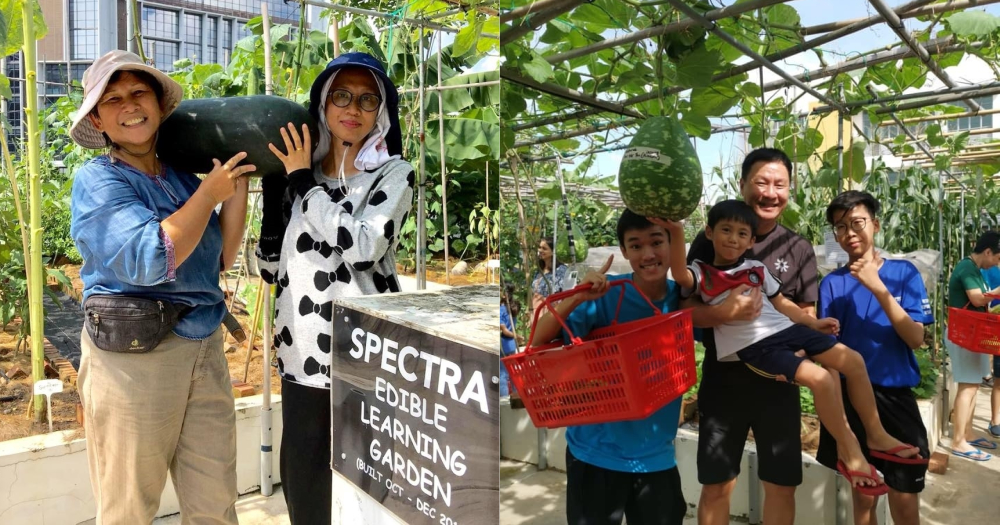One Friday morning in November, I found myself surrounded by stalks of corn, rows of spinach, and banana trees in full bloom.
Yes, I was still in Singapore.
But no, I was not in Choa Chu Kang or some Kranji farm.
I was actually at the fourth floor rooftop garden of Spectra Secondary School in Woodlands, located right smack in the HDB residential estate with industrial buildings in the area.
The garden is hidden behind the school facade and you would have missed it even if you are living or working in the area.
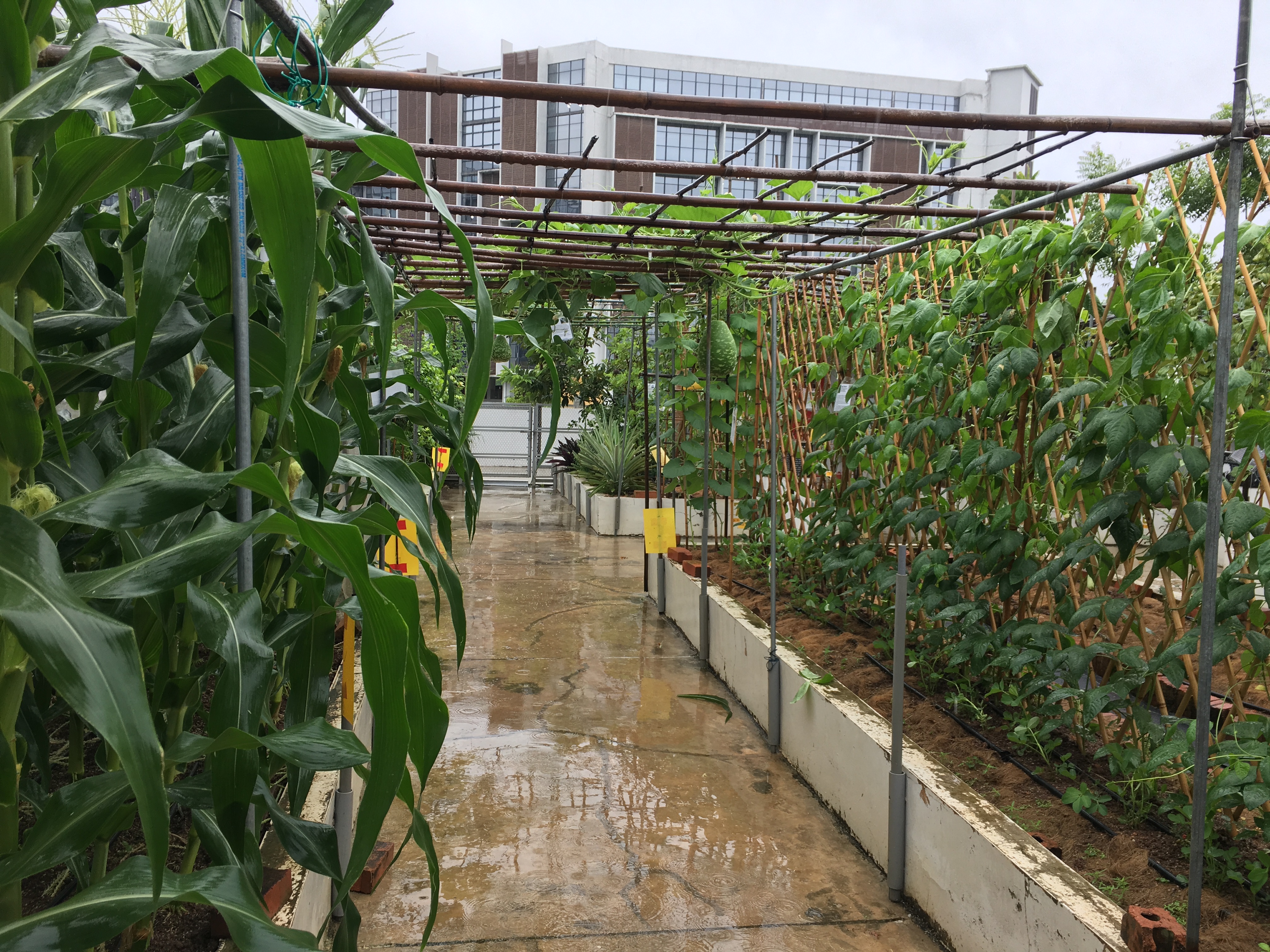 Spectra's rooftop garden. Photo by Jane Zhang.
Spectra's rooftop garden. Photo by Jane Zhang.
I was there to learn more about the school's Edible Learning Garden from Lyvenne Chong-Phoon, the staff developer at Spectra Secondary School.
The green space is a community garden that also functions as an outdoor classroom for all secondary one students.
The woman behind it all
While Phoon's name card designates her role as “School Staff Developer”, it would be fitting for it to also read “Gardening Queen”, “Weed Whisperer”, and “Fruit Fairy.”
She visits the place almost every day -- weekdays to teach classes, Saturdays to tend to the plants with her team of volunteers, and even some Sundays for her own personal “therapy day” when she feels like it.
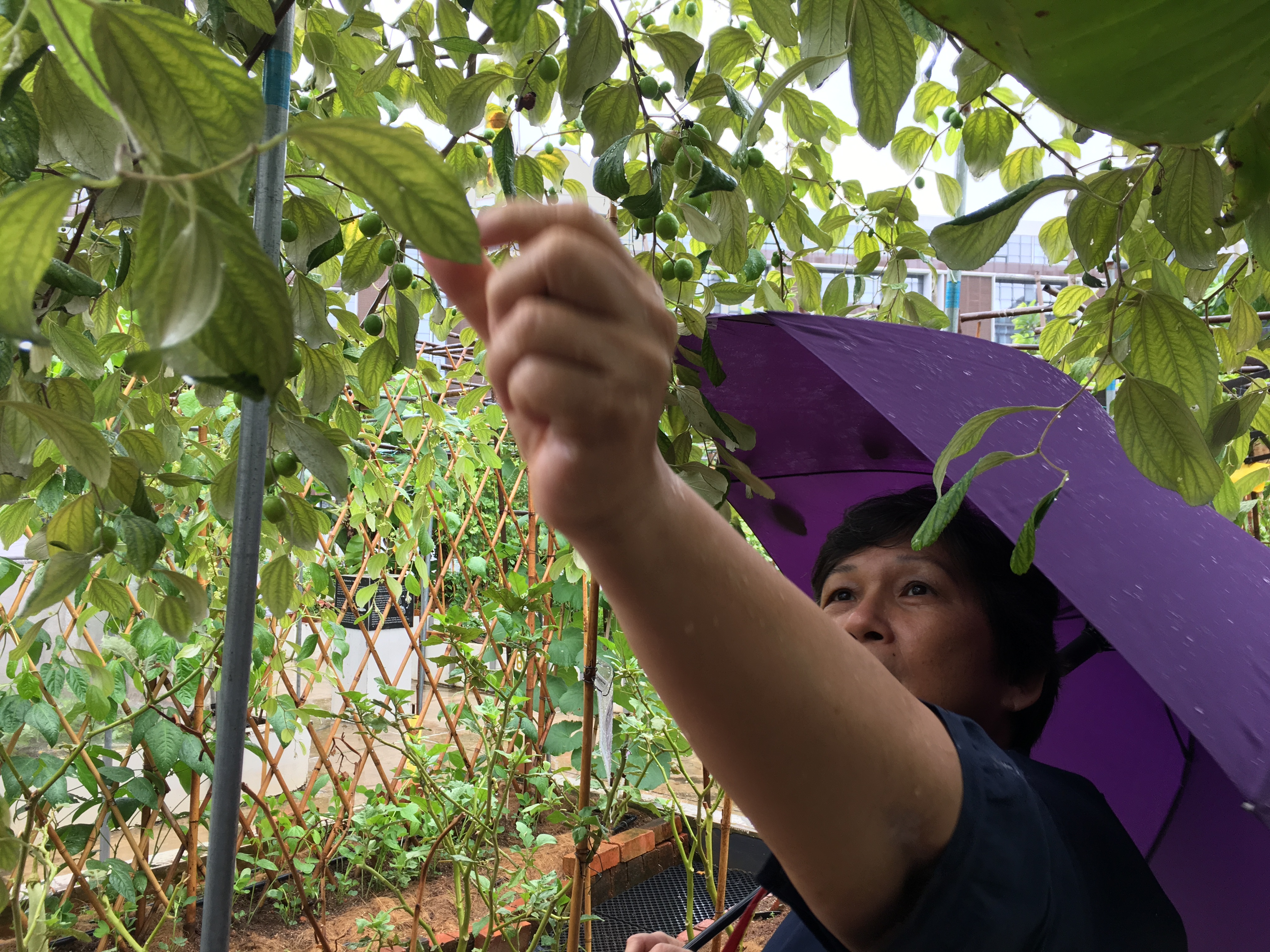 Photo by Jane Zhang.
Photo by Jane Zhang.
The 61-year-old’s enthusiasm overflowed as she walked us through the garden and threw random tidbits of information at us.
In just the first few minutes, I learnt how long it takes to grow corn (60 to 75 days), how to train pumpkins to climb trellises and grow vertically when the planter space isn't wide enough for them to creep horizontally (keep trimming them), and the difference between manual and bee pollination (it’s simpler than it sounds, as Phoon went on to explain).
She said: “Very easy! You look for a female flower and a male flower and you marry them!”
She then demonstrated this civil union for us by plucking the top off one of the stalks and rubbing it against the silk of the corn while exclaiming, “IVF! IVF!”
 Image by Jane Zhang.
Image by Jane Zhang.
Given Phoon's enthusiasm for sharing this urban farming knowledge with others, it is fitting, then, that she spends a good portion of her mornings doing just this with the secondary one students in Spectra Secondary School.
Garden-based learning programme
Spearheaded by Phoon, the Garden-Based Service Learning (GBSL) programme has been part of the school's curriculum since 2015 and it offers students a different mode of learning.
Each class of secondary one students meets once a week for 10 weeks from about 8am to 9:30am to learn in and about the garden.
Each lesson usually begins in the classroom, where the class teacher and another teacher -- usually Phoon -- lead the students in a lesson on theory and prepare them for their work in the garden.
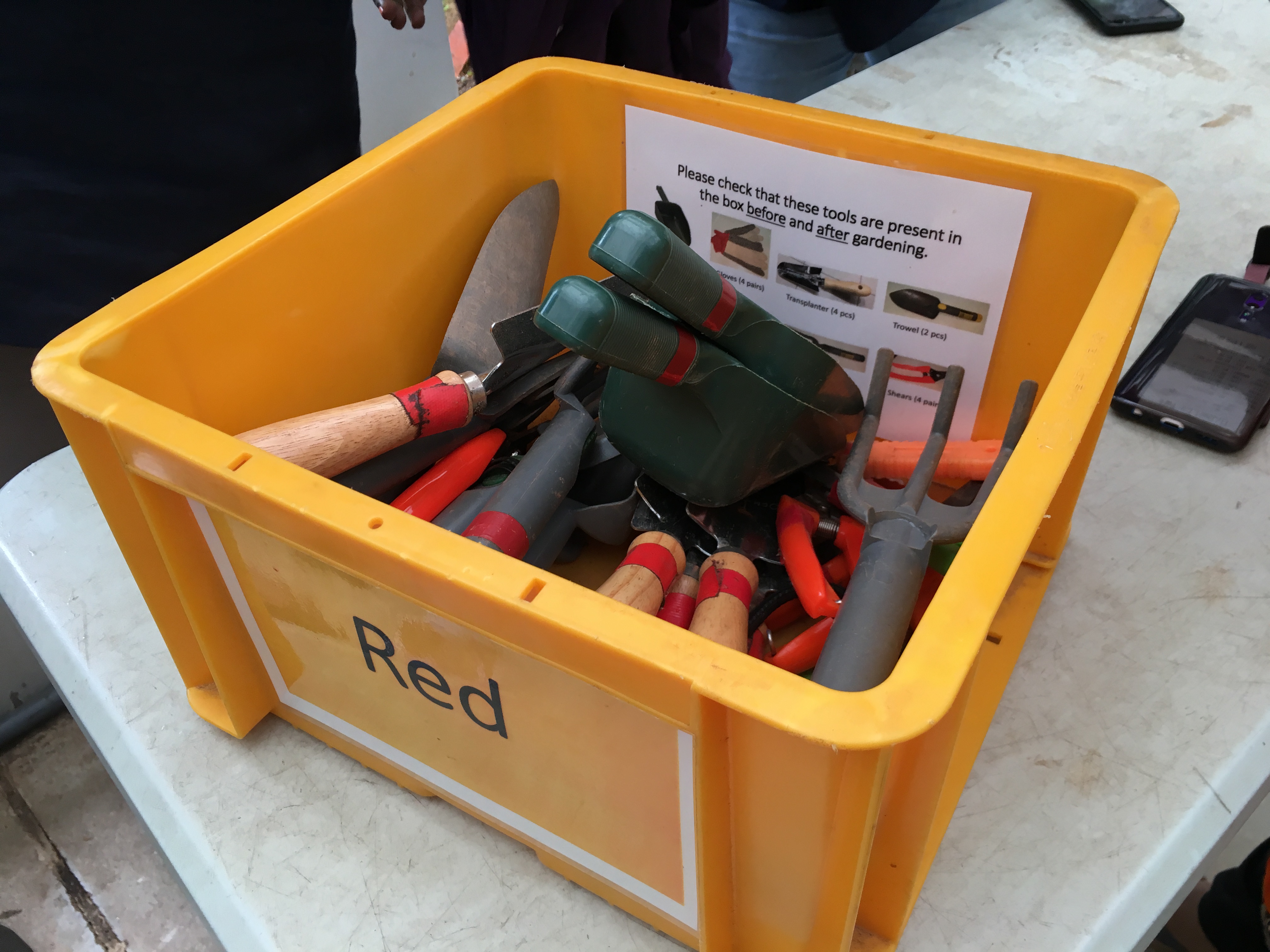 Instructions are clearly written to help aid students in the garden. Photo by Jane Zhang.
Instructions are clearly written to help aid students in the garden. Photo by Jane Zhang.
Then, the students make their way to the garden to put their newfound knowledge into action.
Each class ends with some time for the students to reflect on what they have learnt.
Phoon emphasised to us that the goal of the programme is not to teach gardening skills.
Laughing, she explained that this is an important point to stress because some parents might be worried that their children are being taught to be farmers.
Rather, the purpose is to teach values and skills to students through gardening and give students the chance to have more hands-on and experiential learning activities outside of the classroom.
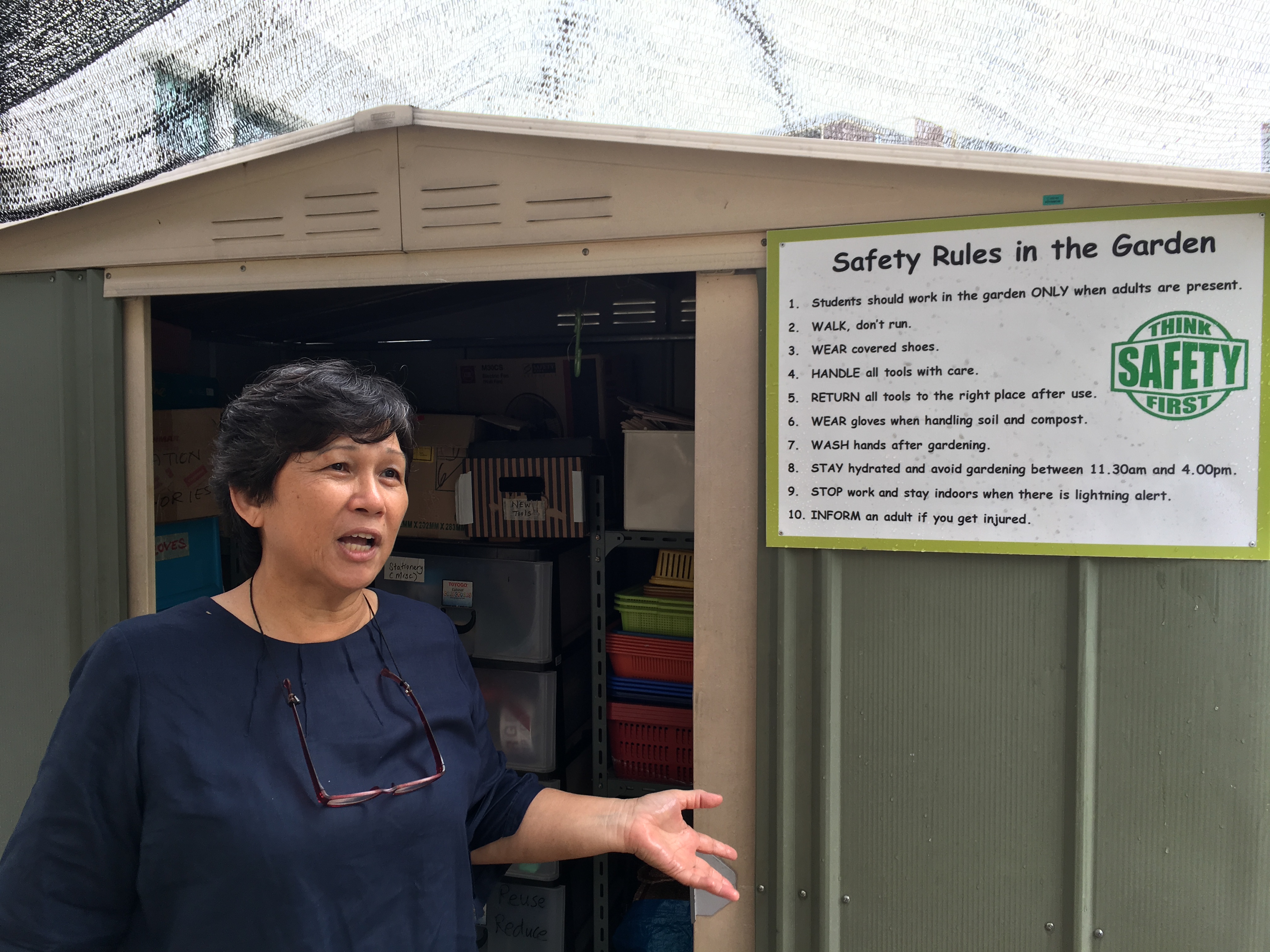 Photo by Jane Zhang.
Photo by Jane Zhang.
The idea for the programme first came about when Phoon was a Curriculum Planning Officer at the Ministry of Education.
Her focus was on developing the curricula for the two upcoming specialised schools for Normal Technical students, one of which was Spectra Secondary School.
One of Phoon's work trips took her to the United States, where garden-based learning was already well-established.
After visiting a few schools in San Francisco, the idea of integrating edible gardens into the curriculum was concretised in her mind, and she instructed the architects of Spectra Secondary School to build one for the school.
A gardening programme in school may sound like a fluffy and unstructured idea, but this is far from true for Spectra Secondary School’s garden curriculum.
In fact, while the school was in the process of being constructed, Phoon put in extensive research on what the curriculum should look like.
A self-proclaimed lifelong learner, she decided, at the age of 55, to pursue a master’s degree in education at the University of Sydney in 2012.
For her course, she intensely studied the theory behind garden-based learning and wrote her final research paper about it.
One U.S.-based study showed that garden-based learning programmes were effective in connecting students’ achievements in school with intrinsic motivation and achievement.
Phoon highlighted the importance of this kind of atypical learning for the students at Spectra Secondary School, who are “hands-on learners”.
The GBSL curriculum provides the students with a chance to interlace this hands-on learning in the garden with other subjects.
For example, students gain a better understanding of science by learning about water conservation in the garden.
They practise their math skills by handling money at the school’s quarterly farmer’s markets, when the students sell the produce that they have carefully cultivated during that term.
Students also acquire research skills in order to learn about different types of crops and the usual market price at which to sell them at the farmers' markets.
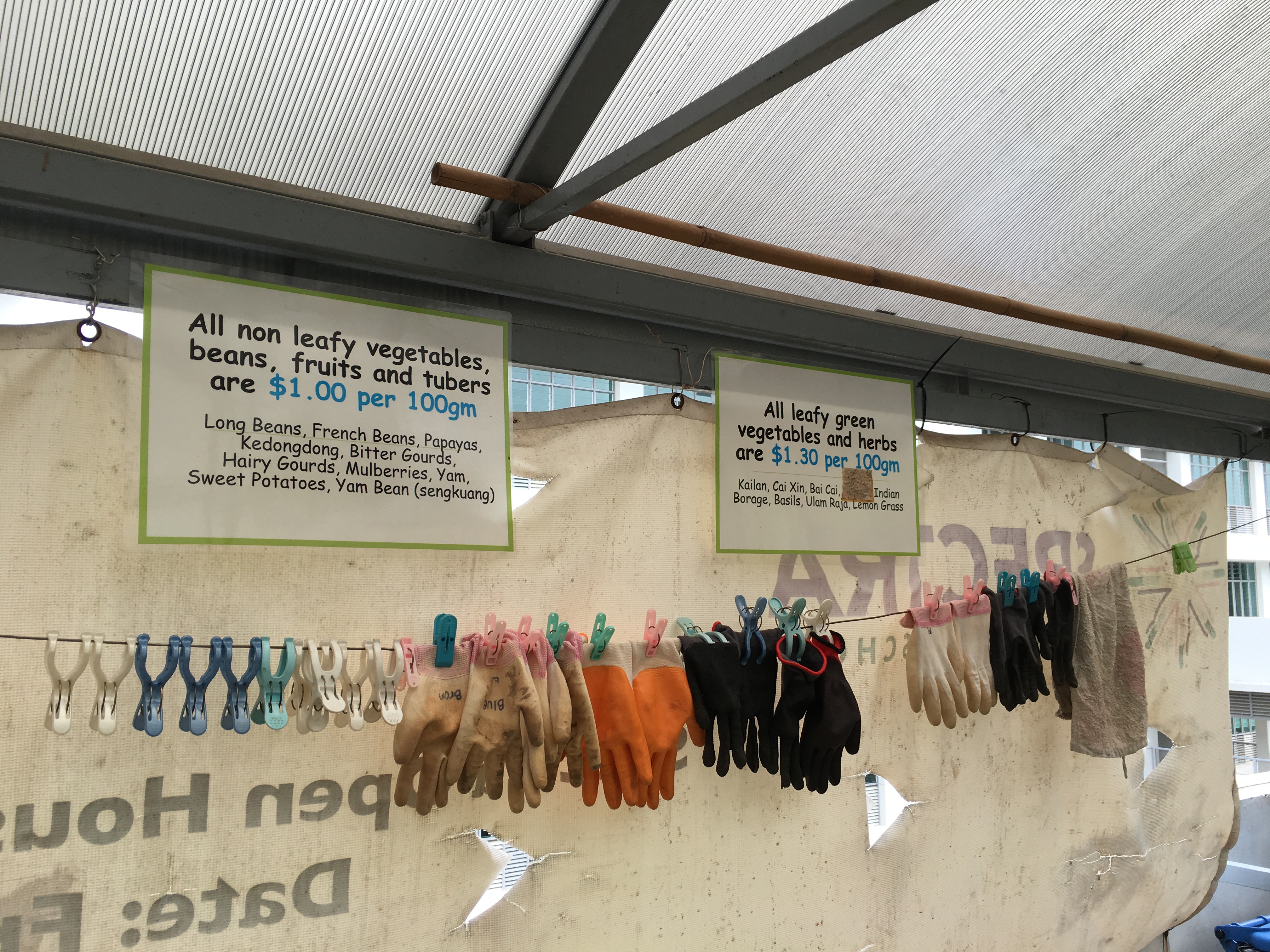 The pricing of produce sold by the students at Spectra's quarterly farmers markets. Photo by Jane Zhang.
The pricing of produce sold by the students at Spectra's quarterly farmers markets. Photo by Jane Zhang.
In addition to academic knowledge, the GBSL programme also seeks to have other outcomes, such as developing curiosity, problem-solving skills, and environmental empathy in the students.
Sharing is caring
While the main purpose of the garden is for education, it has morphed to serve a variety of other needs as well.
For one, it has become a place for Phoon's personal passion to be shared with others.
As she led us through the garden, she suddenly exclaimed: "Wah! The corn has grown so big! I wasn't here for one week.”
Halfway through explaining that a knee injury had kept her out of the garden for the past week, Phoon suddenly whipped out her phone and pointed it at the corn.
She paused her explanation, saying: "Let me take a video of this amazing..."
She trailed off as she took the video, too overcome with pride toward its growth since she last saw it.
She explained that she would later post the video on Urban Farmers (Singapore), a Facebook group that she is very active in.
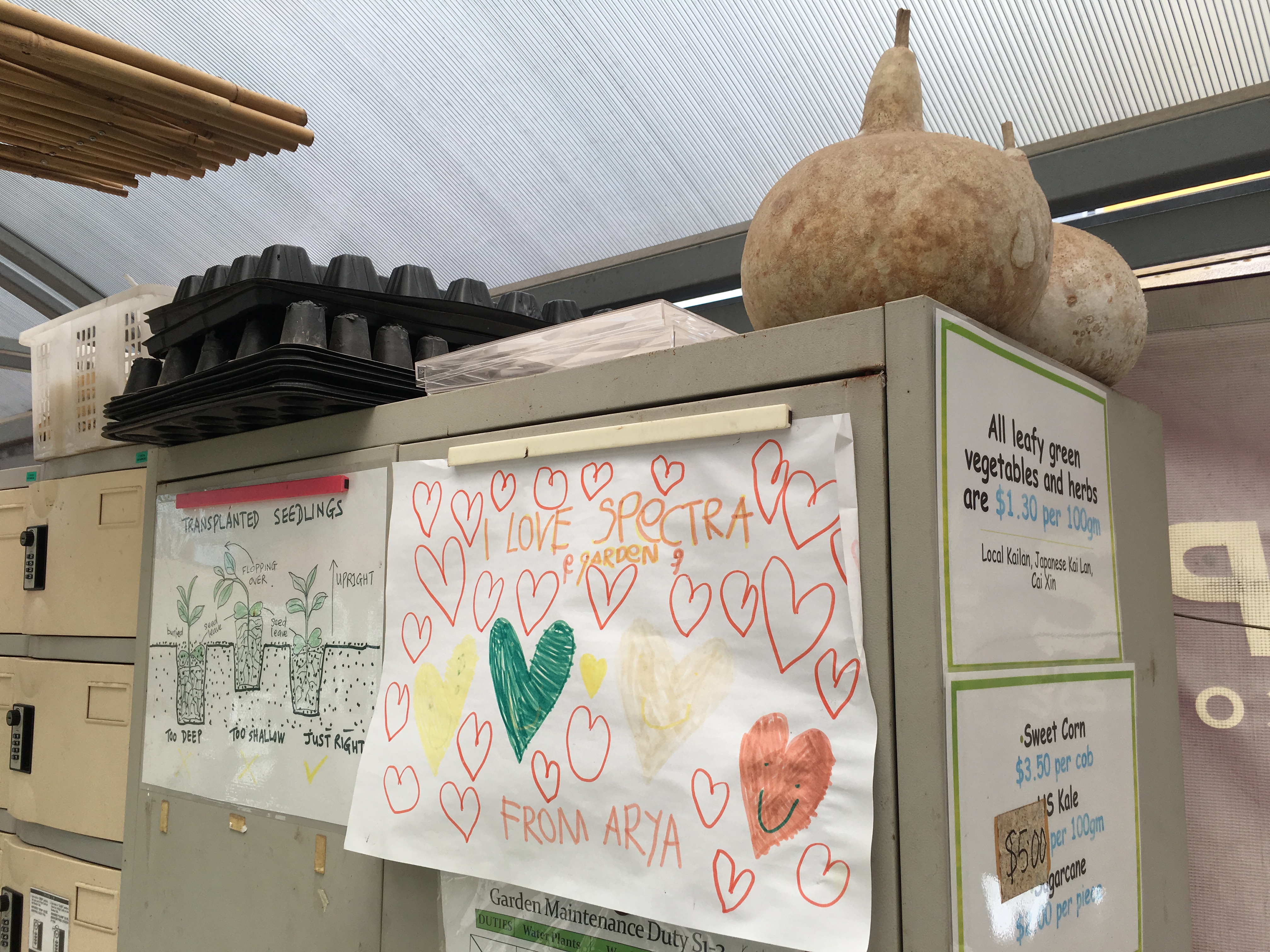 Photo by Jane Zhang
Photo by Jane Zhang
Phoon is very present on social media, sharing the progress of the garden’s plants not only on the Urban Farmers Facebook group, but also on the Spectra Secondary School's Facebook page, as well as her own personal Facebook.
While it is not surprising that Phoon chooses to share photos of her projects on social media, what intrigued me was how open she is about making the concrete gardening knowledge that has cost her huge amounts of time, energy, and money over the years to glean, so readily available to others.Throughout the morning, she constantly shared advice with us on the best practices that she has learned over the years, such as:
- Use metal poles rather than bamboo poles for the structures, as bamboo poles will rot.
- Plant pink flowers in the garden in order to attract bees to pollinate the other produce.
- Leafy greens need more refined soil than large plants.
- Some vegetables need to be fresh while others can't grow for too long, so carefully time when you plant different vegetables.
- Sweet corn is sweetest within the first three days of being plucked, before it begins converting to starch.
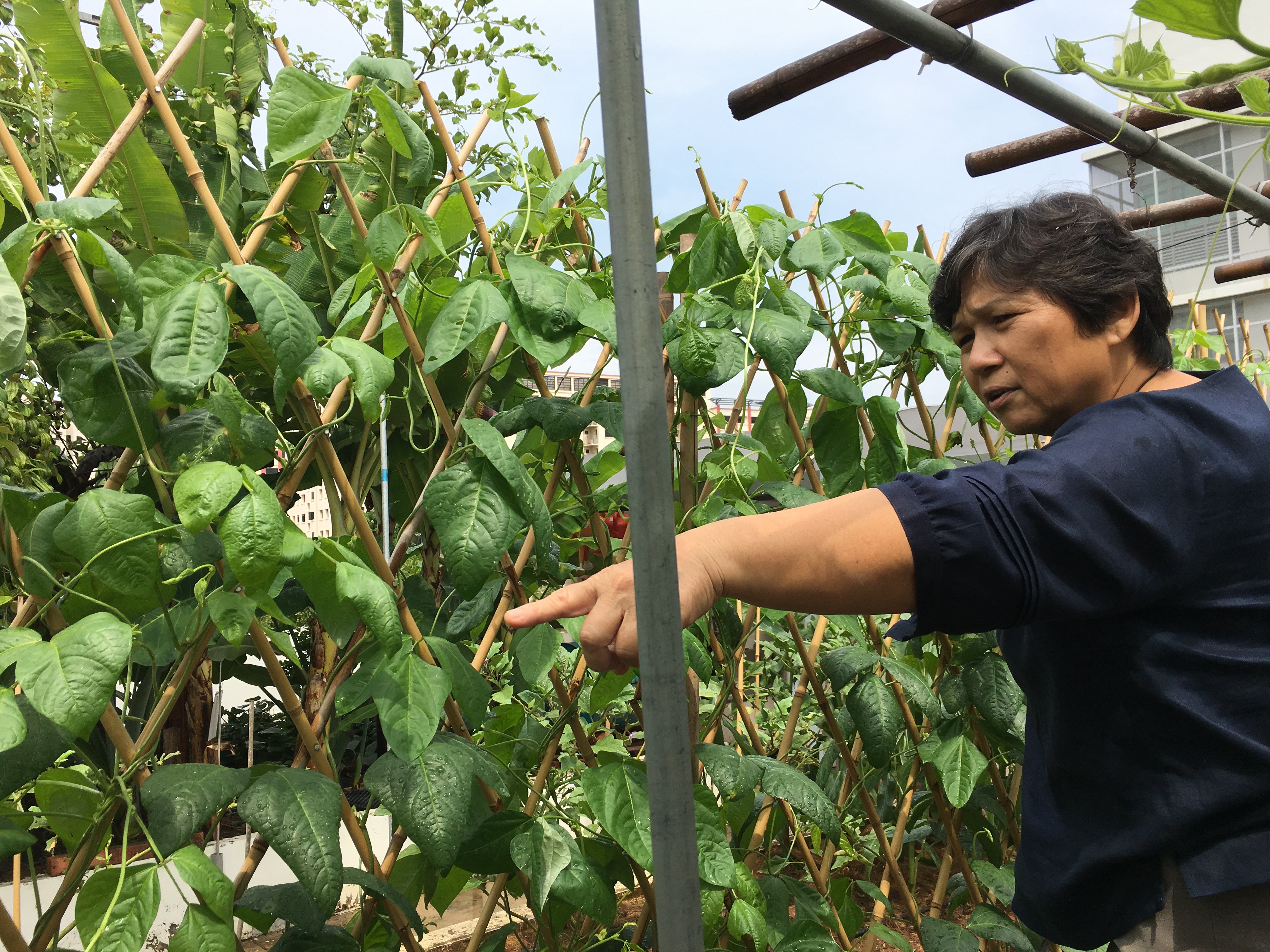 Phoon pointing out a plant in the garden. Photo by Jane Zhang.
Phoon pointing out a plant in the garden. Photo by Jane Zhang.
Later that morning, Phoon handed out copies of the workbooks that they had designed for the students to use in past years, as well as copies of the full curriculum calendar.
Phoon and the other teachers in her garden committee had carefully planned and designed everything in the curriculum, even sitting down at the end of every term to tediously analyse what had gone well and what needed to be revised.
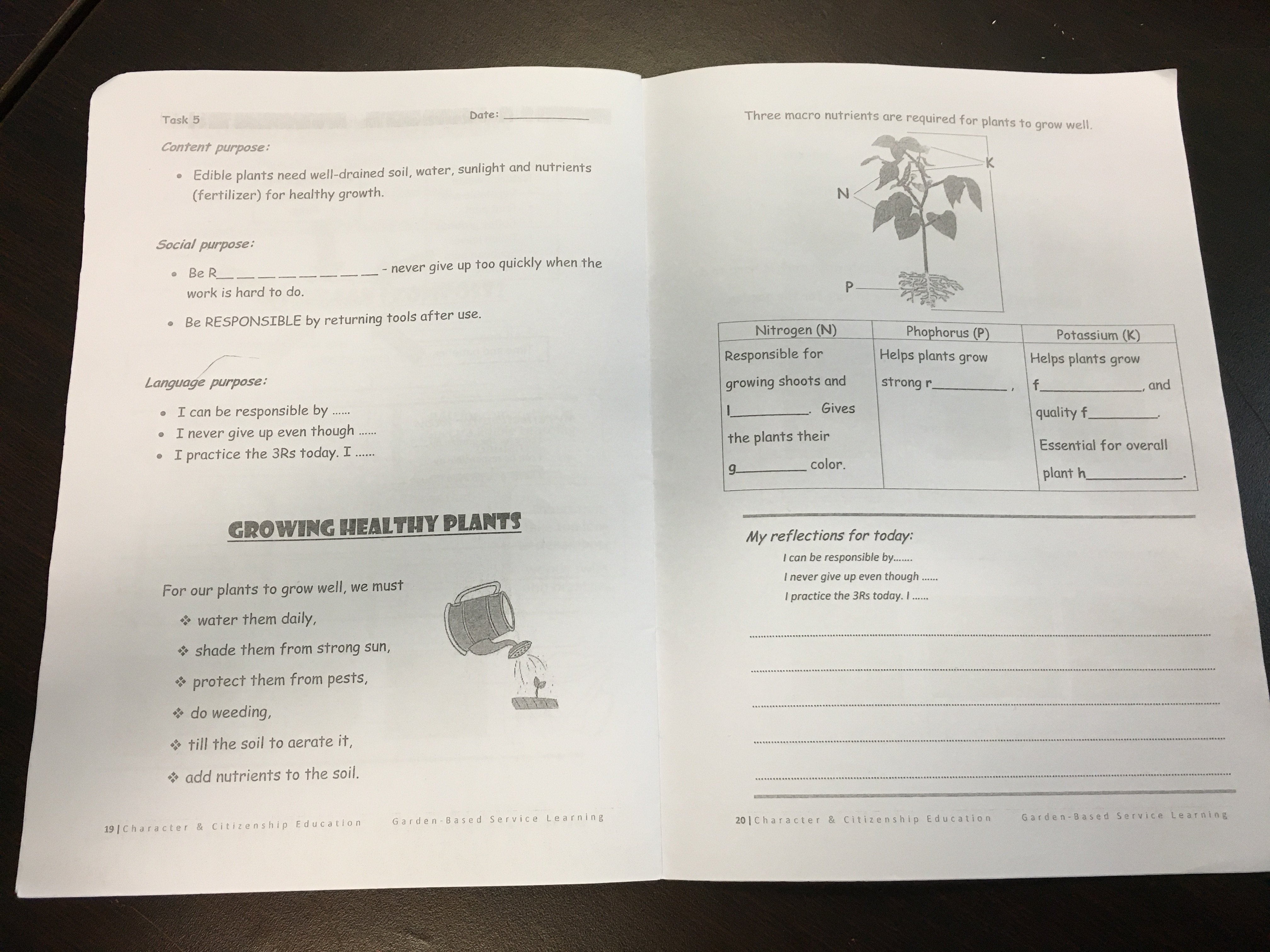 Pages from the GBSL workbook. Image by Jane Zhang.
Pages from the GBSL workbook. Image by Jane Zhang.
When one teacher in our group asked Phoon if it was okay to bring back the materials with her to study when preparing her own curriculum, Phoon enthusiastically said, "Of course! Take, take!"
When I asked her why she was so open to sharing the knowledge that has taken her so much to gain, she brushed it off, saying:
“It’s education, right? Why should it be a secret? The more we share the knowledge of growing, the more people can grow.”
Personal passion turned community space
Phoon has also been able to translate her love for gardening and teaching into something that serves the broader community, by enlisting the help of volunteers to run things.
It is a mutually beneficial relationship. Phoon needs volunteers to help with supervising the students on class days, running the quarterly farmers’ markets, and doing weekly upkeep, such as weeding, planting, and harvesting.
On the other hand, nature-loving volunteers have a space in which they can flex their green thumbs.
When new volunteers come onboard, Phoon explains to them her philosophy: that everything they do in the garden is for the purpose of education.As long as they are agreeable to working in the garden, not for themselves but for a greater good, they are welcome to join.
Thus, the community spirit makes Spectra an attractive place to volunteer and do what they love: garden.
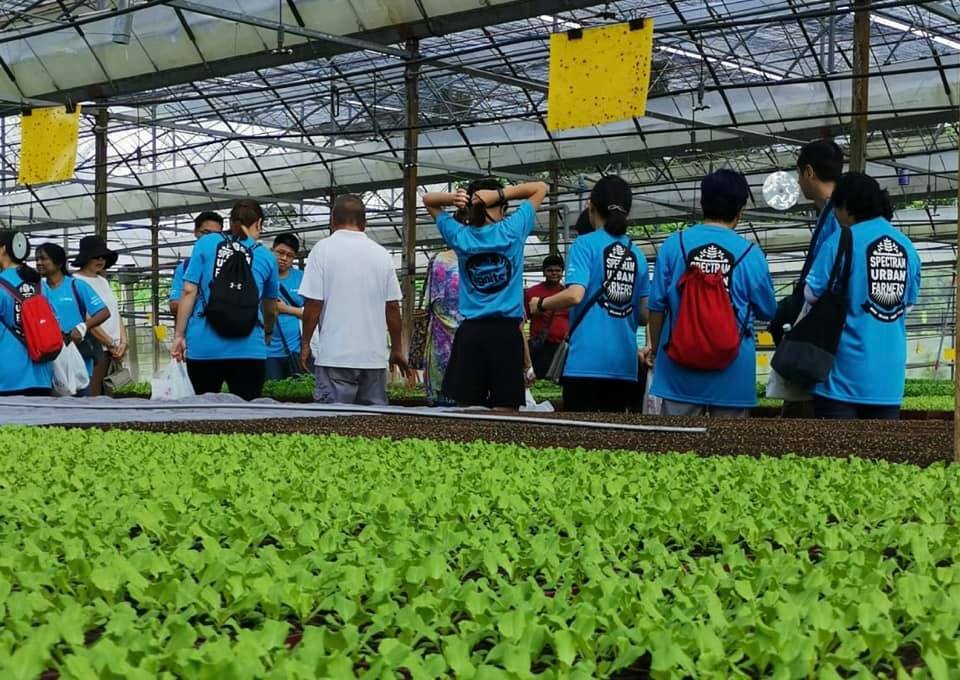 Volunteers on an outing to a farm. Photo from Spectra Secondary School Facebook page.
Volunteers on an outing to a farm. Photo from Spectra Secondary School Facebook page.
The fruits (and vegetables) of their labour
The garden also serves a broader purpose in the community, outside of those directly involved in it.
All funds generated by selling the garden’s produce at the quarterly farmers' markets go toward providing assistance to financially needy students at Spectra Secondary School.
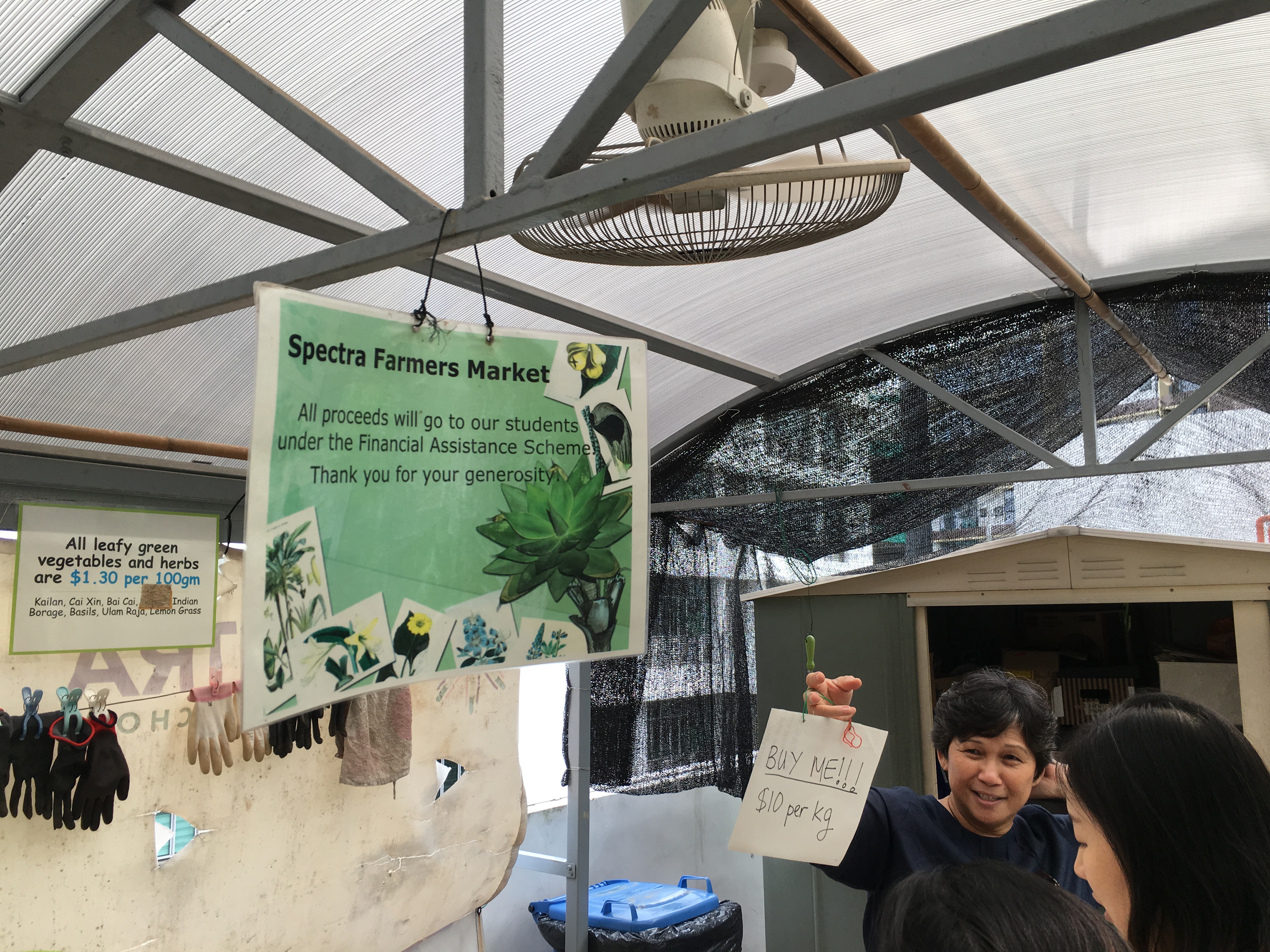 Photo by Jane Zhang.
Photo by Jane Zhang.
Phoon also told us about some individuals who would buy pumpkins to be donated to the nearby elderly care homes.
In those cases, the money that was spent on the pumpkin (around S$50 for a 5kg pumpkin, following market prices for organic produce) would go toward the fund for financially-needy students, and the pumpkin could be used by the elderly home to be cooked for the residents.
And at the most recent farmers market on Saturday, Nov. 23, two customers did just this:
Retiring in December 2020
Phoon played an integral in the ideation, creation, and running of this edible garden which has had its impact felt in many ripples.
From allowing students access to an alternative form of learning to providing the framework for future iterations of garden-based curriculums in schools around Singapore to engaging the broader community and creating social good, the garden has been made possible by Phoon's knack for engaging people and her dedication to education.
As passionate as Phoon is about the garden and her job, she has plans to retire in December 2020.
Luckily, the GBSL programme will be left in the capable hands of Phoon's second-in-command in the garden committee -- science teacher Hamsavallii Suppayan Sodimani, also known as Hamsa.
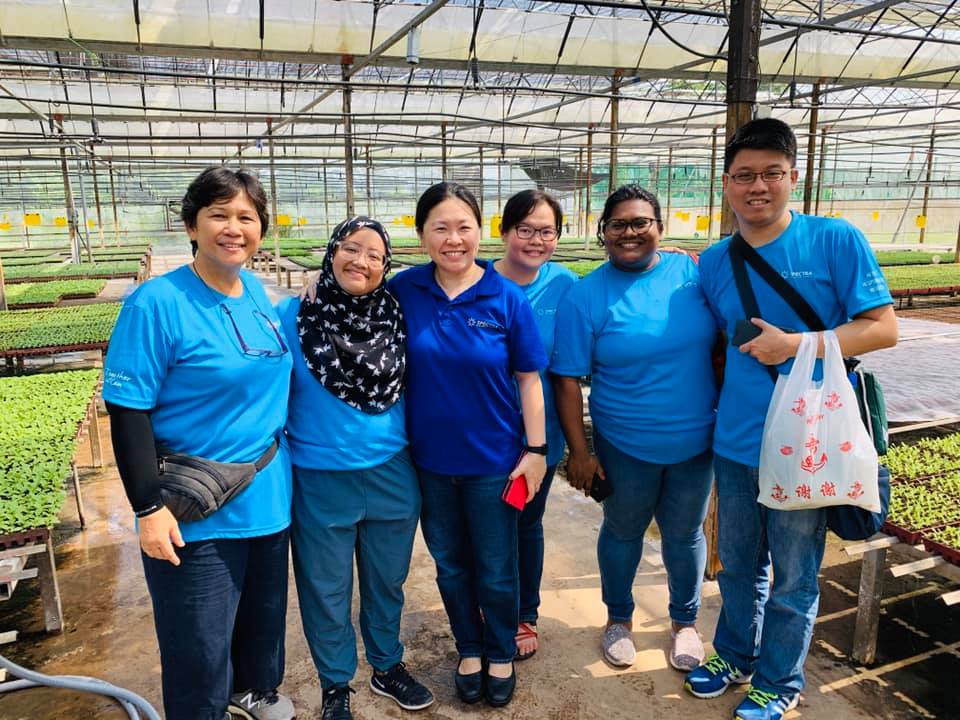 Hamsa (second from right) with Phoon and several other teachers from the garden committee. Photo from Spectra Secondary School Facebook page.
Hamsa (second from right) with Phoon and several other teachers from the garden committee. Photo from Spectra Secondary School Facebook page.
As for Phoon, stepping back from running the entire programme does not mean she will be abandoning Spectra’s garden, as it is such a huge part of her life.
She shared that she plans to continue helping where her passion lies -- rallying volunteers and sharing knowledge with those around her as they learn together.
The garden has become like a second home for her, and is not something she plans to give up anytime soon, if she has her way.
Because what better thing is there to do with her time than to spend it the way she has for the past few years in the place she has put so much love and energy into?
She exclaimed laughing: “Every day I wake up, see my husband, see my maid. Then do what? Come to garden lah!”
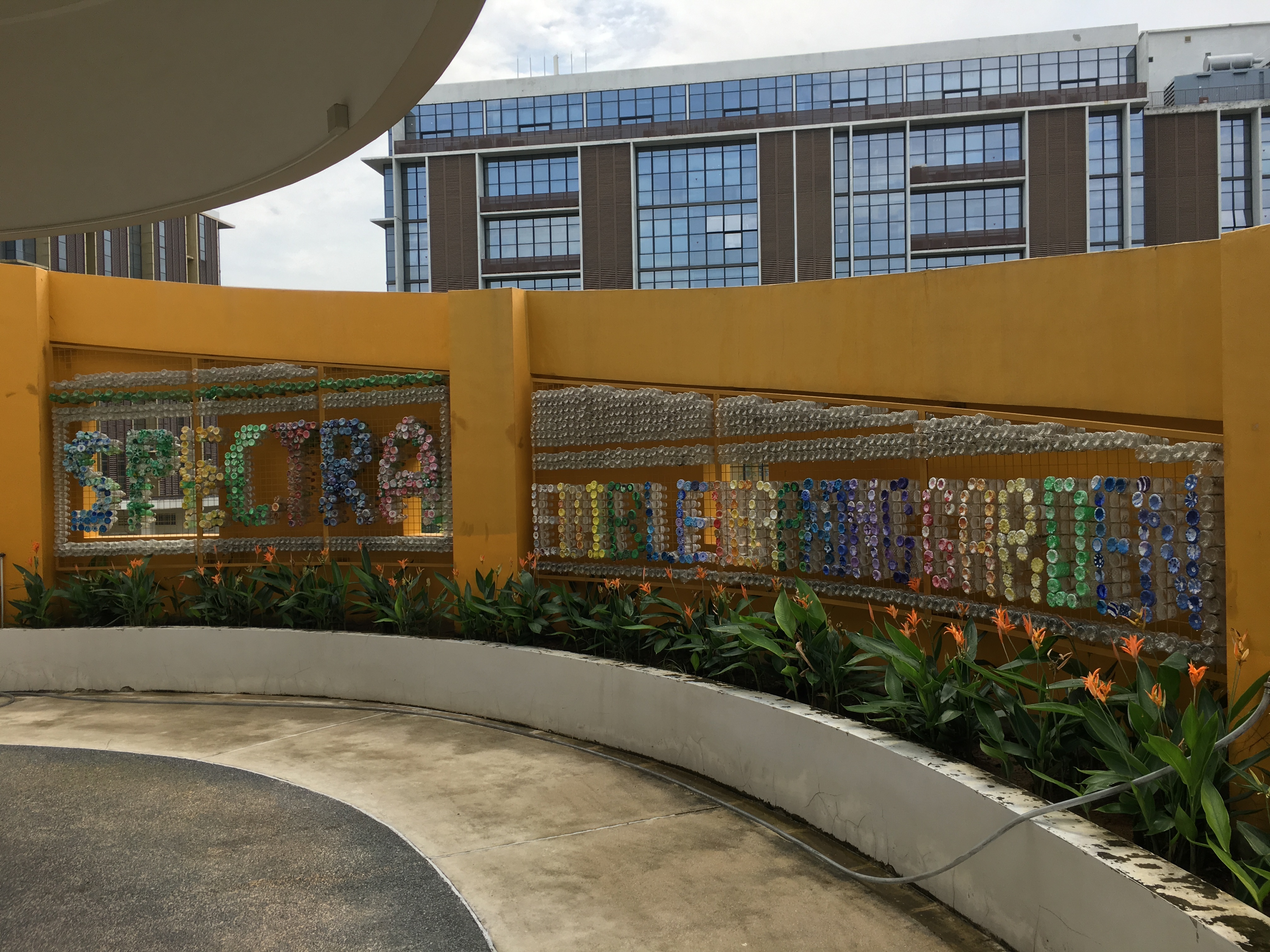 A sign made of painted recycled plastic bottles spelling out "Spectra Edible Learning Garden". Photo by Jane Zhang.
A sign made of painted recycled plastic bottles spelling out "Spectra Edible Learning Garden". Photo by Jane Zhang.
Top photo collage via Spectra Secondary School/Facebook
If you like what you read, follow us on Facebook, Instagram, Twitter and Telegram to get the latest updates.
